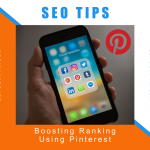A 4-Part Social Media Marketing Strategy for Beginners

Small businesses have been dubbed as the backbone of the American economy, what with 99.9% of American companies being composed of privately owned establishments. While there are many reasons for the rise of small businesses, the most significant is arguably that of a good social media marketing strategy.
Social networks such as Facebook, Instagram, and Twitter have become the equalizer that evened out the marketing arena for big companies and their smaller counterparts. Social media platforms allowed independent entrepreneurs to have direct marketing access to their target customers at a much more affordable cost compared to regular advertising platforms.
However, just like any type of advertising, a social media marketing campaign requires a combination of creativity, impeccable timing, and data-driven decisions.
Social Media Marketing 2019: Stats You Need to Know
Although social channels have given independently owned companies a quick way to reach potential customers, competition among brands is still stiff. Advertising intelligence company Crayon revealed that on average, brands compete against 25 similar companies on social media sites.
To be noticed in such a competitive environment, small business owners need to always be updated when it comes to social media strategies. In fact, creating your social business plan relies heavily on how much you know about content marketing and social media. How is social media influencing how business is done? How can you use it to your advantage whether you’re an online or a local business?
Notable social media statistics for 2019
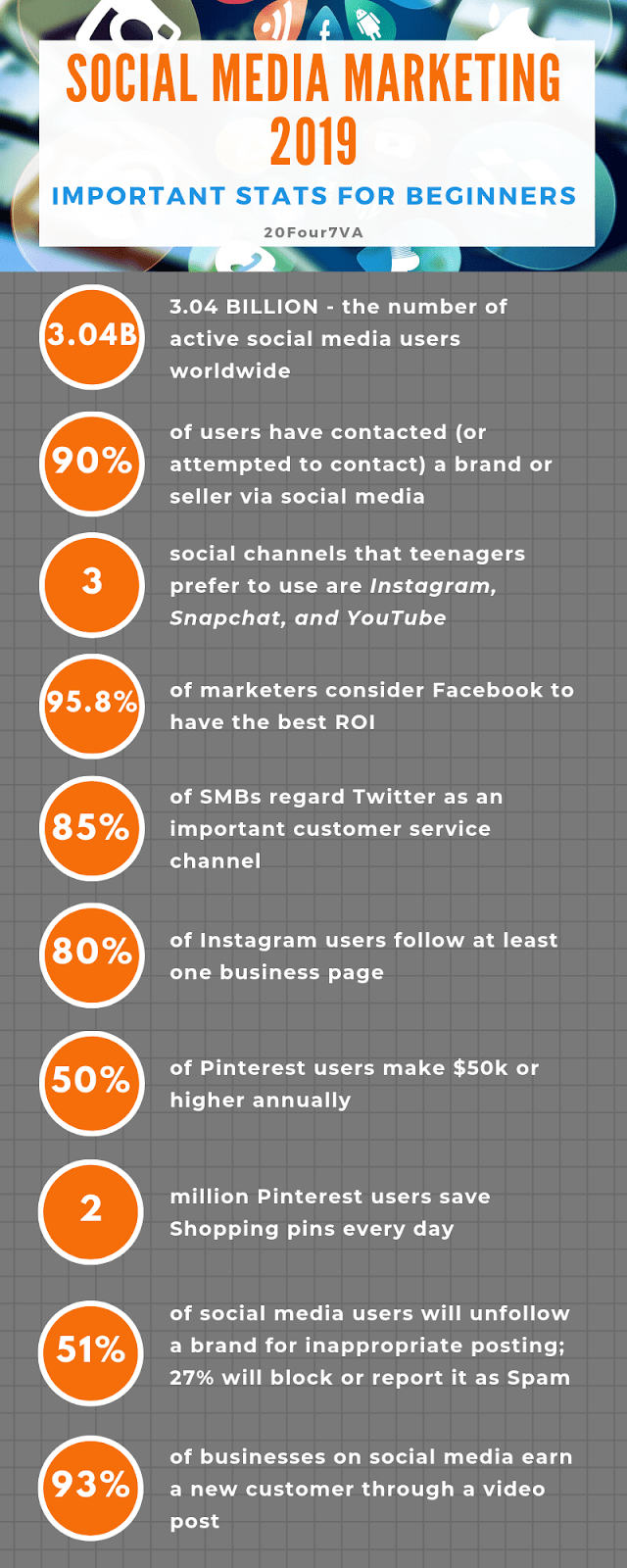
- There are roughly 3.04 billion active social media users around the world, most of whom are on mobile.
- 90% of social media users have made attempts to contact a brand or seller
- The most frequently used social apps among teenagers are Instagram, Snapchat, and YouTube. Instagram is popular among users aged 35 and below
- 95.8% of marketers claim Facebook has the best ROI
- 85% of small-medium business establishments regard Twitter as an important customer service platform
- 80% of Instagram users follow at least one business page
- 50% of Pinterest users have an annual income of $50k or higher
- 2 million Pinterest users save Shopping Pins on their boards every day
- 51% of social media users would unfollow a brand on social media for posting inappropriate or irritating content; 27% of them would either block it or report it as Spam
- 93% of businesses win over a new customer through a social media video post
Apart from showing how powerful social media has become when it comes to brand awareness and influence, it also tells entrepreneurs which channels are most suited for their business. Are your products for teenagers and young adults? It may be better to funnel your investments to Instagram. Do you want to improve your customer service? Perhaps Twitter can help you out.
Of course, you should also arm this data with a solid action plan, one that is best suited to your current standing as a beginner.
So, how do you take the first step? What can you do so your brand doesn’t get lost in a sea of similar brands, some of whom have more to spend on advertising?
Wondering how to use social media for your startup or small business? Check out this 4-part guide on social media marketing for beginners below.
Tips on Building Your Social Media Marketing Strategy
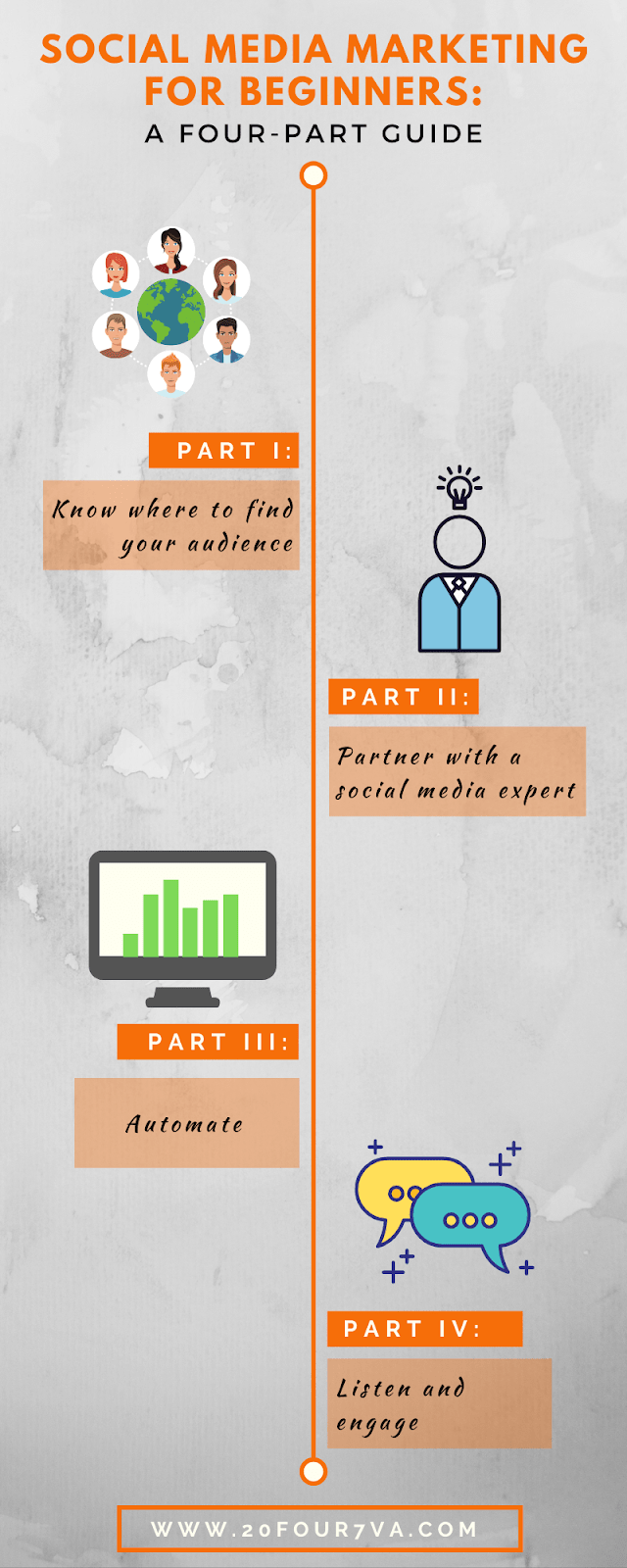
PART I: Know where your audiences are
What’s the best social media for advertising? This is probably one of the first questions you ask when brainstorming for a social media marketing strategy. However, it’s time to tweak your question.
Why? Because different sets of people prefer different social channels. Sure, it sounds ideal to spend the same amount of time and money on all platforms available at your disposal. However, that kind of approach can easily drain your funds. You’ll do better if you determine which channels your audiences frequent instead and put in more of your investments there.
Check out these demographics of adults in the US when asked if they use the following social channels:
Facebook:
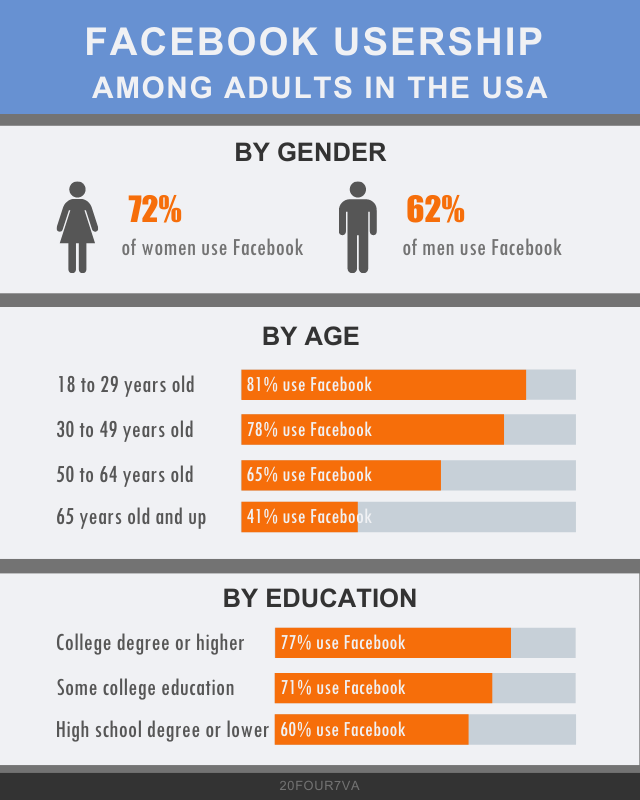
Gender:
- Women – 72%
- Men – 62%
Age:
- 18-29 years old – 81%
- 30-49 years old – 78%
- 50-64 years old – 65%
- 65 years old and up – 41%
Education:
- College degree or higher – 77%
- Some college education – 71%
- High school degree or lower – 60%
Insight: Facebook is great for B2C companies whose target audiences are either men or women between 18 to 64 years old.
Twitter:
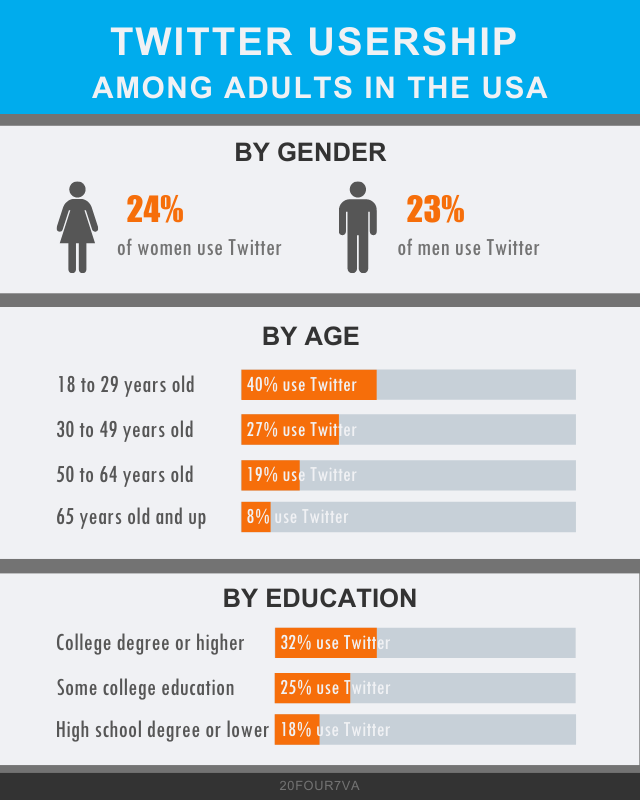
Gender:
- Women – 24%
- Men – 23%
Age:
- 18-29 years old – 40%
- 30-49 years old – 27%
- 50-64 years old – 19%
- 65 years old and up – 8%
Education:
- College degree or higher – 32%
- Some college education – 25%
- High School degree or lower – 18%
Insight: Twitter is ideal for both B2C and B2B companies whose target audiences are either men or women between 18-29 years old.
Pinterest:
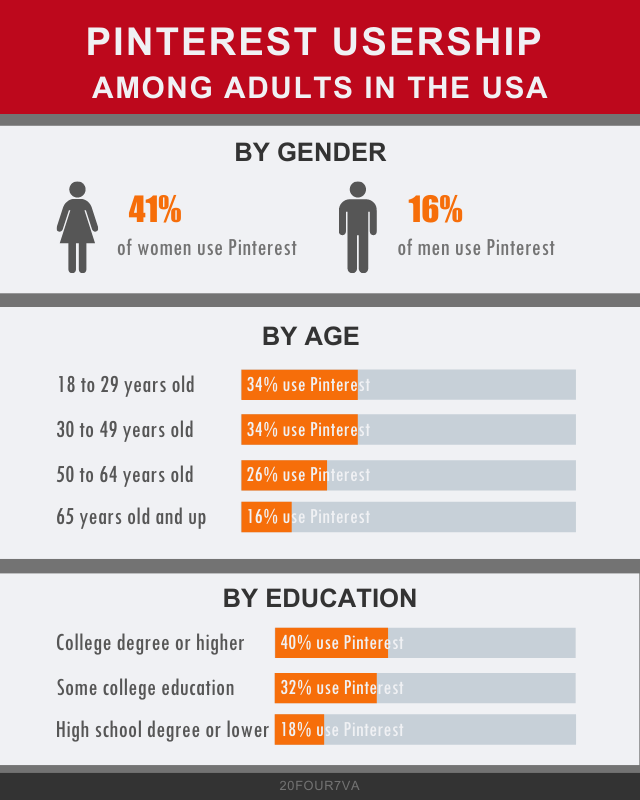
Gender:
- Women – 41%
- Men – 16%
Age:
- 18-29 years old – 34%
- 30-49 years old – 34%
- 50-64 years old – 26%
- 65 years old and up – 16%
Education:
- College degree or higher – 40%
- Some college education – 32%
- High School degree or lower – 18%
Insight: B2C companies will find Pinterest most useful if their target customers are females between 18-49 years old.
Instagram:
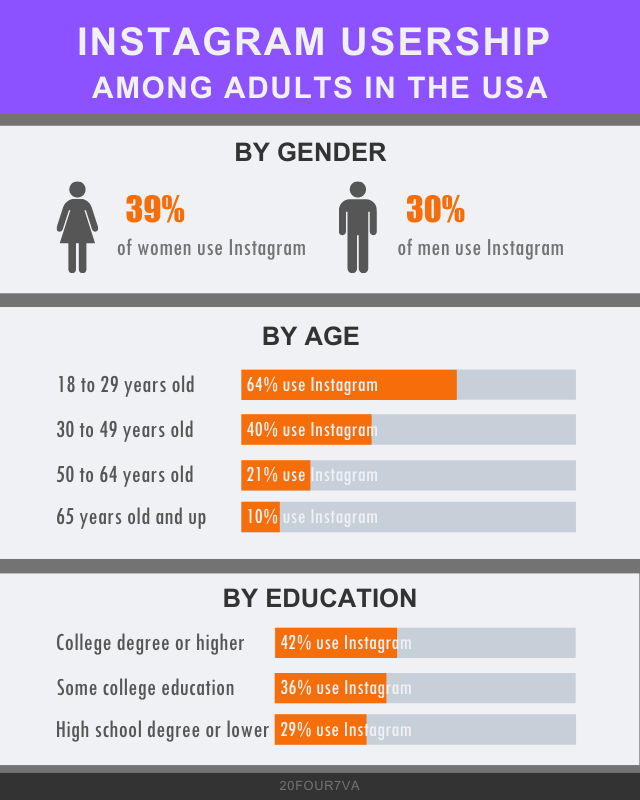
Gender:
- Women – 39%
- Men – 30%
Age:
- 18-29 years old – 64%
- 30-49 years old – 40%
- 50-64 years old – 21%
- 65 years old and up – 10%
Education:
- College degree or higher – 42%
- Some college education – 36%
- High School degree or lower – 29%
Insight: Instagram is great for B2C companies whose target audiences are women between 18-49 years old.
YouTube:
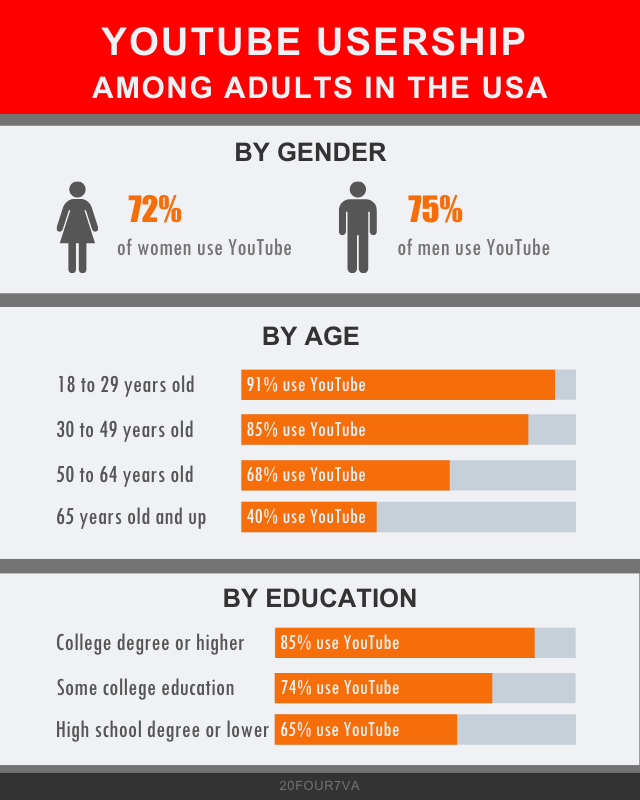
Gender:
- Women – 72%
- Men – 75%
Age:
- 18-29 years old – 91%
- 30-49 years old – 85%
- 50-64 years old – 68%
- 65 years old and up – 40%
Education:
- College degree or higher – 85%
- Some college education – 74%
- High school degree or lower – 65%
Insight: YouTube is best for both B2C and B2B companies whose target audiences are either men or women between 18-64 years old.
PART II: Partner with an expert
Working with an expert isn’t always popular in social media marketing for small businesses. Perhaps it’s because the idea sounds costly and unnecessary. After all, if social channels are simple enough to use, they have to be simple enough to manage, right? Wrong.
Remember, you want to create a name for your brand in a crowded environment for an audience with a limited attention span. A social media specialist can help you get to your goal faster.
Here’s what a social media manager can do for you:
- Take care of the basics, including creating accounts and filling out profile information.
- Create or edit social media posts, including photos and captions.
- Schedule social media posting.
- Respond to comments, messages, and feedback.
- Craft or edit content for both organic and paid ads.
- Gather and study analytics reports.
Worried about your budget? Know that you can find an affordable hiring arrangement through virtual assistance. When you partner with virtual assistant companies such as 20four7VA, you can collaborate with a social media specialist on terms that won’t break the bank nor compromise the work output.
PART III: Automate
Apart from social platforms, another technology-given gift that entrepreneurs have today is automation. You can be hands-on without pouring hours upon hours on arduous tasks. When you automate, you are choosing to work smart rather than working hard. You save time and energy without putting productivity on the line. On the contrary, you’ll be more creative and motivated when you’re not burdened with piles of work!
From creating a posting calendar to actually posting on your profiles, from managing customer relationships to auto-sharing your website posts to your social media followers, there are several tools that business owners can use. Here are 12 awesome social media tools to build your repertoire.
PART IV: Listen and engage
It’s easy to get caught up in the technicalities of marketing that you end up losing focus on its core: the people. This is a rookie mistake you can’t make, especially in social channels. Remember, you’re on Facebook, Instagram, or Pinterest to connect with your audience. Different tips and tricks will come and go but the best social media marketing strategy is one that gives utmost priority to people.
So, make sure your audience always feel heard and valued. Here’s what you can do:
- Reply to comments, wall posts, or direct messages.
- Post user-generated content. Not only will your followers and customers appreciate it when you share their posts mentioning you, you get an easy way to post customer feedback as well.
- Mind your tags. Some users post or tag their favorite brands. When they post about your products, give them a shout out or share their posts on your channel.
- Offer quick solutions. When people post about or message you their complaints, validate their concerns and offer solutions. People now prefer to use social media for customer service, and they expect to get it fast. Put together answers or solutions for frequently raised concerns so problems are promptly resolved.
- Link resources. Published a How To blog post? Link people directly to your blog page. Posted a pricing update? Make sure customers can quickly access it. Help people navigate from your social channels to your website pages by giving them a direct link.
To sum up
Facebook, Instagram, Pinterest, Twitter – these channels and more have given you equal footing with bigger brands when it comes to reaching your customers. Leverage them using this 4-part guide on social media marketing for beginners.
Want help when it comes to implementing and tracking the results from this 4-part strategy? Hire a social media virtual assistant! A social media VA can free up your time so that you can focus on doing income-generating tasks while they do the hard work on your social media pages. Schedule a free consultation call with us and let’s talk about your social media marketing strategy and how a virtual assistant can help you out!










